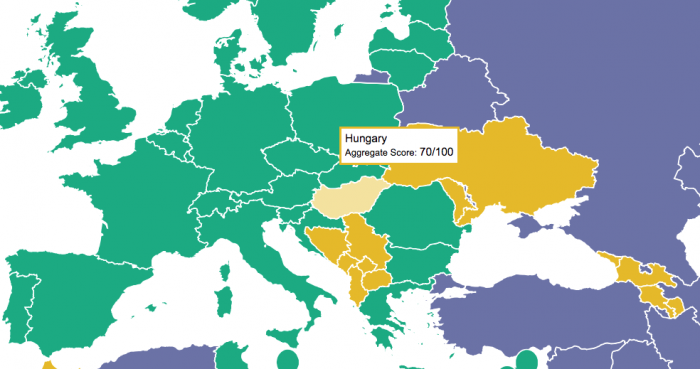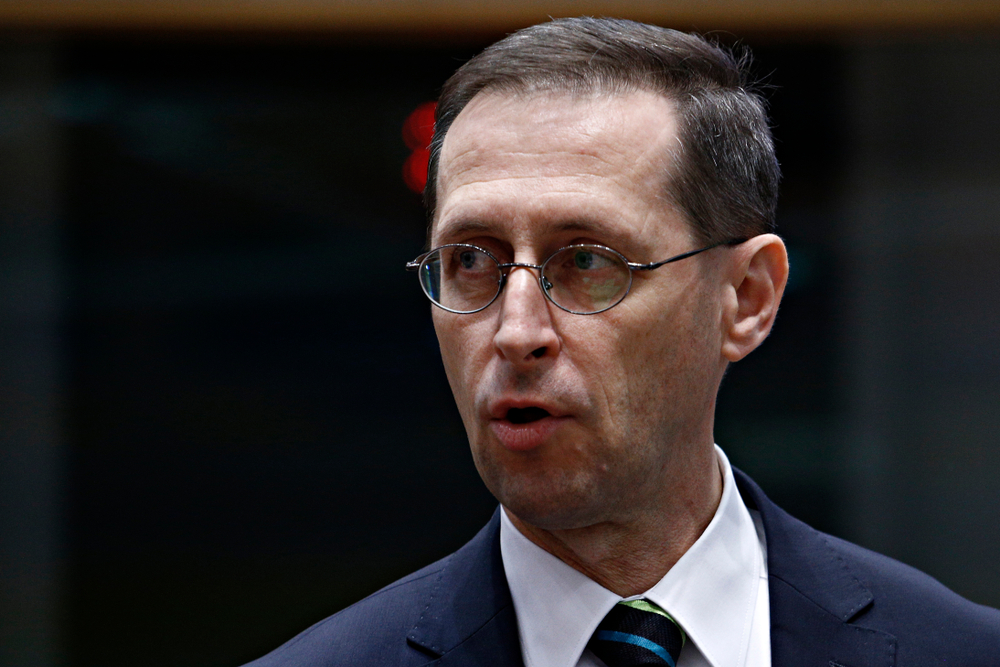‘Partly Free’ - Freedom House downgrades Hungary

freedomhouse.org
According to “Freedom in the World 2019,” the latest annual survey issued by U.S.-based, government-funded watchdog Freedom House, Hungary is now only a “Partly Free” country, with worsening scores for political rights and civil liberties, becoming the first country in the EU that is not currently classified as “Free.”
Image: freedomhouse.org
In the reportʼs summary, Freedom House criticizes the unevenness of the Hungarian political playing field, saying that the 2018 election campaign, in which the governing Fidesz regained its two-thirds majority, was characterized by harsh anti-migrant rhetoric and characterizations of Prime Minister Viktor Orbán as a defender of “traditional” Christian values in Europe.
“The opposition’s ability to challenge Fidesz was significantly hampered by the ruling coalition’s mobilization of state resources, media bias, and restrictions that affected opposition access to the advertising market,” notes the report.
Furthermore, the report notes how six opposition parties were fined by the State Audit Office (ÁSZ) prior to the 2018 elections, which the parties had little opportunity to challenge.
Freedom House stresses several other key factors that are raising concerns, including the governmentʼs refusal to resolve the status of the Central European University (CEU), effectively forcing it to leave the country; enacted constitutional amendments that include provisions making it the obligation of all state organs to defend Christian culture; and the creation of new legal grounds for limitations on the freedom of assembly.
In subcategories, Hungary lost a point in response to the question: “Is there a realistic opportunity for the opposition to increase its support or gain power through elections?”
“The score declined from 3 to 2 [out of 4] because a variety of obstacles, including politicized audits, media bias, and the ruling party’s abuse of state resources, hampered the ability of the opposition to rally support ahead of elections,” Freedom House argues.
The country also lost a point in response to the question: “Are individuals free to practice and express their religious faith or non-belief in public and private?”
“The score declined from 4 to 3 because a number of churches have been unable to regain their previous status after it was revoked under a 2011 law, and because growing anti-Muslim sentiment has discouraged the open practice of Islam,” the report says.
Corruption, press freedom
On the subject of corruption, Freedom House finds that corruption remains a problem in Hungary, noting that “instances of high-level government corruption have not been properly investigated.”
“For example, the prosecutor’s office has been reluctant to investigate long-standing allegations that the government misused development funds provided by the EU,” it notes.
The report also highlights restraints on press freedom, observing that national, regional, and local media are increasingly dominated by pro-government outlets, which are “frequently used to smear political opponents.” It also points to the closure of major independent daily newspapers Népszabadság and Magyar Nemzet, among other outlets, as evidence of a shrinking independent media.
In addition, the report cites the donation by the owners of most pro-government media operations of their holdings to a new foundation, effectively creating a massive pro-government media conglomerate composed of almost 500 titles and outlets.
“The government exempted the transactions from the usual antitrust review, which would almost certainly have led to their suspension if conducted in accordance with the law,” it observes.
Education, judiciary
On the subject of education, Freedom House reports that a gradual overhaul of the public education system has raised concerns about excessive government influence on school curriculums, while noting that legislation adopted in 2014 allows for government-appointed chancellors empowered to make financial decisions at public universities.
“Selective support by the government of certain academic institutions also threatens academic autonomy,” it adds, while noting the governmentʼs revocation of accreditation from all gender studies programs and “ideological attacks” against “broader research on inequality, or simply criticism of various government proposals,” leading to a degree of self-censorship at institutions.
Judicial independence also remains a matter of concern for Freedom House, noting that all 11 judges appointed to the Constitutional Court between 2010 and 2014 were named by the Fidesz government. It also quotes one retired judge as saying that the country’s judges operate in “a general climate of fear” of repercussions for ruling against Fidesz interests.
“In December, the parliament approved a measure allowing the establishment of a separate system of administrative courts that would be overseen by the justice minister, prompting concerns that it could be filled with judges sympathetic to the ruling party,” the report stresses.
Declining freedom
Overall, Hungary has an Aggregate Freeedom Score of 70/100, where 100 represents the “Most Free.” Of the main sub-indicators, on a scale of seven, where a score of 1 represents “Most Free” and 7 “Least Free,” Hungary scores 3/7 in its “Freedom Rating,” and the same for “Political Rights” and “Civil Liberties.”
Hungary, which became “Free” in 1990, falls back to “Partly Free” this year after five consecutive years of decline and 13 years without improvement, notes the report. Hungary now joins a group of nearby countries such as Ukraine and Moldova in this category.
Freedom House is an independent watchdog organization dedicated to the expansion of freedom and democracy around the world, according to the organizationʼs website. Founded in 1941, it describes itself as the first U.S. organization to champion the advancement of freedom globally.
“We recognize that freedom is possible only in democratic political environments where governments are accountable to their own people; the rule of law prevails; and freedoms of expression, association, and belief, as well as respect for the rights of minorities and women, are guaranteed,” it claims.
Launched in 1973, Freedom Houseʼs flagship annual “Freedom in the World” survey of global political rights and civil liberties employs a methodology devised by leading social scientists, analyzing and rating countries on a series of fundamental freedom indicators.
SUPPORT THE BUDAPEST BUSINESS JOURNAL
Producing journalism that is worthy of the name is a costly business. For 27 years, the publishers, editors and reporters of the Budapest Business Journal have striven to bring you business news that works, information that you can trust, that is factual, accurate and presented without fear or favor.
Newspaper organizations across the globe have struggled to find a business model that allows them to continue to excel, without compromising their ability to perform. Most recently, some have experimented with the idea of involving their most important stakeholders, their readers.
We would like to offer that same opportunity to our readers. We would like to invite you to help us deliver the quality business journalism you require. Hit our Support the BBJ button and you can choose the how much and how often you send us your contributions.








